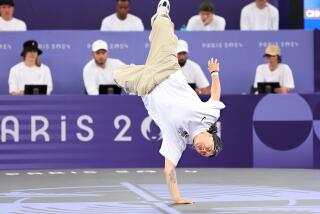Boxing Provides Another Bizarre Story--This Time It’s a Battle Royal
- Share via
NBC, faced with sagging ratings, needed something to stir things up at the Olympics. And leave it to the sport of boxing provide it.
The talk of the Games earlier was about Anthony Hembrick’s disqualification for tardiness.
Now it’s another bizarre boxing story--Korean cornermen and a security official going after New Zealand referee Keith Walker following Korean Byun Jong-Il’s 4-1 loss to Bulgarian Alexandar Hristov. And NBC was right on top of it. Well, almost.
NBC couldn’t go to the melee immediately because at the same time the U.S. volleyball team was at game point in the important fourth game of its 5-game victory over Argentina.
NBC wisely waited until the United States had the fourth game in hand, which took quite a while, then went to the boxing scene, which was both tragic and comical.
The post-fight fighting got rather ugly, as commentator Ferdie Pacheco noted. He called the actions of the Korean coach “criminal,” adding that he should be banned. Pacheco made another point: “Where is the security?”
Byun, the loser, refused to leave the ring after the fight, so NBC put a clock on him. He left after 67 minutes.
Bryant Gumbel, who is loaded with all kinds of information, earlier informed viewers that in 1964 a Korean flyweight had recorded a 51-minute sitdown following a controversial loss. Of Byun, wise-guy Marv Albert, at the 28-minute mark, said, “He’s going for the world record.”
Gumbel had the best line, however. As Byun’s sitdown stalled other matches, Gumbel said, “You think about Anthony Hembrick and wonder where was Byun when he needed him.”
Add melee: NBC dispatched reporter Wallace Matthews to talk to the security official who entered the ring. Matthews asked some tough questions, such as, “If it is your job to keep order, what were you doing in the ring?”
One problem, though, was the Korean spoke very little English and couldn’t really defend himself. But then, even if he spoke perfect English, he probably wouldn’t have had a defense for his actions.
NBC is to be congratulated for staying with the U.S.’s big volleyball win over Argentina. And Chris Marlowe is to be congratulated for some good commentary. He noted at game point in the fourth game that, historically, this is where Argentina usually goes in the tank. And Argentina did.
NBC has been generally getting high marks for its Olympic coverage, but the camera work on swimming was drawing criticism.
In particular, cuts from wide overview shots to close-ups had left viewers confused and unable to identify the competitors.
After Tuesday night’s telecast, Dick Cline, NBC’s swimming producer, said: “I don’t like it either. I’m depending on the world feed from SORTO (Seoul Olympic Radio and Television Organization), so when they cut away for an extended time to focus on the leader, we can’t see the race developing.”
Cline has 4 NBC cameras to supplement the SORTO pictures, but he has been using them for isolated replays. “If these cutaways continue, I’m going to have to use one of my isolated cameras for our basic coverage,” he said.
NBC executive Peter Diamond met with the world broadcasters prior to Wednesday night’s telecast and lodged a minor protest about the camera work. It seemed to pay off. Swimming coverage Wednesday was considerably better.
Trivia Dept.: The amount of information Bryant Gumbel has at his fingertips is impressive. On Tuesday night, immediately after Anthony Nesty of Suriname had won a gold medal in the 100-meter butterfly, Gumbel said, “There are only 10 swimming pools in all of Suriname and only 1 50-meter Olympic-sized pool.”
NBC’s Olympic researchers have done their work.
Caustic Costas: Bob Costas had some quick responses during Tuesday night’s coverage. After Fritz Dennerlin, the portly coach of the Italian water polo team, pulled off his shirt to reveal an expansive belly, Costas said: “One lesson to be learned at any Olympics is when not to remove your shirt on international TV.”
When reporter Jim Gray told Costas that Korean security people are actually living in and patrolling the sewers, Costas said: “I was unware that Ed Norton was part of the Seoul security force.”
More to Read
Go beyond the scoreboard
Get the latest on L.A.'s teams in the daily Sports Report newsletter.
You may occasionally receive promotional content from the Los Angeles Times.






